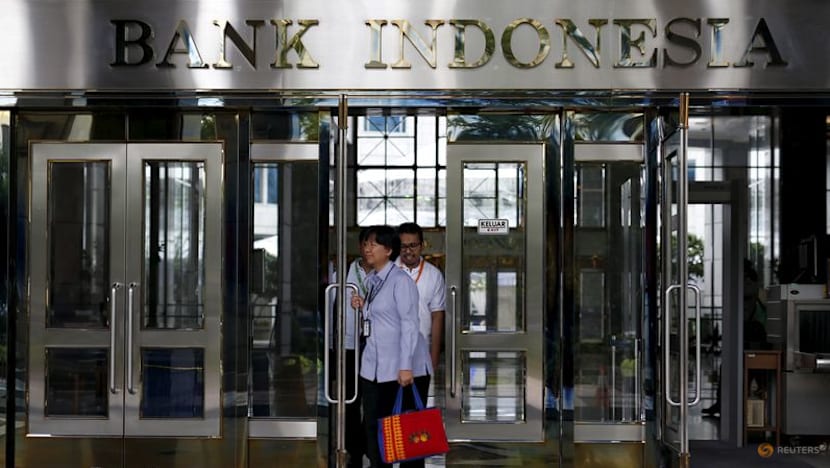Bank Indonesia to hold rates this week as political shake-up hits rupiah: Reuters poll

People walk out of a building inside the Bank Indonesia complex in Jakarta, Indonesia, on Dec 16, 2015. (Photo: REUTERS/Darren Whiteside)
BENGALURU: Indonesia's central bank will pause its easing cycle on Wednesday (Sep 15) according to a Reuters poll of economists published a week after the removal of Finance Minister Sri Mulyani Indrawati rattled investor confidence and weakened the rupiah.
Indrawati's sudden exit erased most of the rupiah's gains following a US trade deal struck in mid-July, prompting the central bank to step in to steady the market. Even with that intervention, the currency has fallen about 1 per cent since the trade agreement was agreed.
The renewed currency pressure, coupled with back-to-back rate cuts in July and August, is likely to deter the central bank from lowering borrowing costs again, despite expectations the US Federal Reserve will cut rates just hours later.
All 31 economists in the Sep 9-15 poll expected Bank Indonesia to leave its benchmark seven-day reverse repurchase rate unchanged at 5.00 per cent when the two-day meeting concludes on Sep 17.
The overnight deposit and lending facility rates were expected to remain steady at 4.25 per cent and 5.75 per cent, respectively.
"The abrupt departure of the former finance minister has stoked fears over the government's commitment to fiscal discipline and sapped investor confidence. With the rupiah under renewed pressure, BI's priority is likely to shift back to external stability," said ANZ economist Krystal Tan.
"Recent developments have further strengthened our call for a pause."
While a pause appears certain, concerns are emerging about BI's independence. Under a 'burden-sharing' arrangement, the central bank will help the government programs by raising interest rates it pays on state deposits - a move some economists see as undermining monetary autonomy.
Indonesia announced a 16.23 trillion rupiah (US$989.3 million) stimulus package for the fourth quarter of 2025, underscoring the government's spending push.
Asked about the risk of political influence over monetary policy, seven economists said they were somewhat worried, one said very worried and two said not worried.
"The main idea of burden sharing is simply to help the government finance its ambitious spending plans linked to election promises with a limited multiplier effect. This phase of fiscal dominance suggests potential weakening of central bank independence," said Kunal Kundu, economist at Societe Generale.
"But then again, why just blame Indonesia? One can see that in many parts of the world now."
A separate Reuters poll in July showed more than 70 per cent of economists, 36 of 50, said they were worried about the Fed's independence from political influence.
"At this point, I'd say that I'm somewhat concerned about Bank Indonesia's independence," said Jason Tuvey, deputy chief emerging markets economist at Capital Economics.
"I'd become a lot more concerned if we explicitly saw calls from government officials for rate cuts, unexpected changes to the leadership at the central bank, or a return to primary-market government bond purchases."
Despite those concerns, economists still expect the central bank to ease policy further once stability returns to the rupiah.
Of the 25 economists with a year-end view on rates, 14 forecast a 25-basis-point cut to 4.75 per cent, 10 anticipated two quarter-point cuts to 4.50 per cent, and just one projected a 75-basis-point drop to 4.25 per cent.
"Risks are still skewed towards a cut should the currency stabilises quickly. The policy bias will likely stay dovish," said Adam Ahmad Samdin, economist at Oxford Economics.















